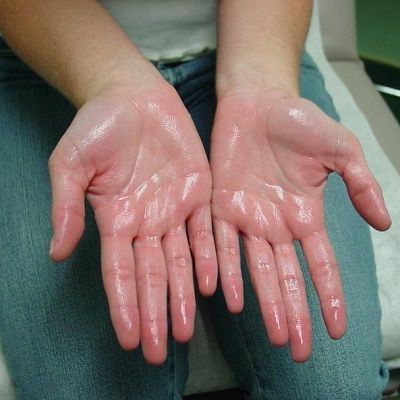Understanding the Source of Excessive Sweating and Its Influence On Daily Life
Excessive sweating, likewise called hyperhidrosis, is a problem that affects a substantial part of the populace, yet its underlying causes and implications on day-to-day functioning stay rather enigmatic. While it is frequently understood as a physical action to control body temperature, the triggers for too much sweating can vary extensively among individuals, including not only physical factors yet also emotional and psychological components. The influence of this condition prolongs past plain pain, commonly affecting social communications and total top quality of life. By diving into the origin of hyperhidrosis and exploring its complex effects, a much deeper understanding of this pervasive problem can be acquired, clarifying the complexities that people facing too much sweating navigate daily.
Physiology of Sweat Glands
The law of sweat manufacturing, an essential physiological procedure, is largely controlled by the activity of sweat glands distributed across the human body. Sweat glands are classified into two main kinds: eccrine and apocrine glands. Eccrine glands are the most various and are discovered in nearly all locations of the body. They play an essential role in thermoregulation by secreting a watery liquid onto the skin's surface area, which vaporizes and assists cool down the body down. In comparison, apocrine glands are concentrated in locations abundant in hair roots, such as the armpits and groin, and their secretions are thicker and milky in appearance.
When the body temperature rises, either due to exercise, heats, or emotional stress and anxiety, the nerve system sets off the sweat glands to generate sweat. This sweat is made up mostly of water and electrolytes like sodium and chloride. The process of sweat manufacturing is important for maintaining the body's interior temperature level within a slim, optimum array, highlighting the critical role gland play in human physiology.
Triggers for Excessive Sweating
In recognizing the origin creates of too much sweating, it is crucial to recognize the triggers that can bring about this physical action. Too much sweating, also called hyperhidrosis, can be motivated by numerous variables, both physical and environmental. One common trigger is psychological stress and anxiety or anxiousness, which can stimulate the body's sweat glands to produce more sweat than is required for cooling down. Physical effort, heats, and spicy foods are additionally known to trigger extreme sweating in people vulnerable to this problem. Additionally, specific clinical conditions like hyperthyroidism, diabetes mellitus, or menopause can add to extreme sweating as well.
Additionally, medicines such as some antidepressants, opioids, and specific supplements can additionally serve as triggers for hyperhidrosis. Recognizing these triggers is essential in taking care of extreme sweating successfully - How to stop sweaty hands. By recognizing and resolving the certain triggers that motivate too much sweating in an individual, medical care suppliers can create customized treatment plans to alleviate this problem and improve the individual's high quality of life
Medical Issue Associated
Connected with too much sweating are numerous clinical conditions that can intensify this physical response. One usual problem is hyperhidrosis, a condition characterized by extraordinarily increased sweating that surpasses the body's thermoregulatory needs. This can manifest in focal areas like the hands, soles, underarms, or face, impacting a person's top quality of life as a result of social embarrassment and pain.
Furthermore, endocrine disorders such as hyperthyroidism, diabetes mellitus, and menopausal hot flashes can also lead to extreme sweating. Hyperthyroidism creates an overproduction of thyroid hormonal agents, accelerating metabolism and triggering sweating.
Furthermore, infections like consumption, HIV, and endocarditis have actually been connected with night sweats, a typical sign known to disrupt sleep and affect total well-being. These clinical problems highlight the varied series of underlying elements that can add to extreme sweating, necessitating thorough analysis and management by health care experts.
Psychological and Psychological Elements

Influence on Social Interactions
Extreme sweating can have extensive impacts on a person's capability to engage conveniently in social communications. The noticeable indicators of sweat discolorations or damp patches on garments can cause embarrassment and self-consciousness, creating people to take out from social circumstances. This withdrawal can impact connections, restriction social click over here now tasks, and hinder specialist and individual growth.

In addition, the stress and anxiety and self-esteem problems stemming from extreme sweating can affect communication and interpersonal skills. Individuals might struggle to concentrate on conversations, take part in team activities, or share themselves with confidence. This can bring about feelings of seclusion and isolation, as social connections become challenging to keep.
Conclusion

While it is commonly comprehended as a physiological action to control body temperature, the triggers for excessive sweating can vary extensively among people, including not just physical elements yet additionally emotional and psychological elements. By diving right into the origin triggers of hyperhidrosis official site and exploring its complex effects, a much deeper understanding of this prevalent concern can be gotten, losing light on the intricacies that people grappling with excessive sweating navigate on a day-to-day basis.
Physical exertion, high temperatures, and spicy foods are additionally recognized to set off too much sweating in people vulnerable to this condition. By identifying and resolving the specific triggers that motivate excessive sweating in a private, health care service providers can create individualized treatment plans to relieve this condition and boost the individual's quality of life.
Extreme sweating can have profound effects on a person's ability to involve conveniently in social interactions.